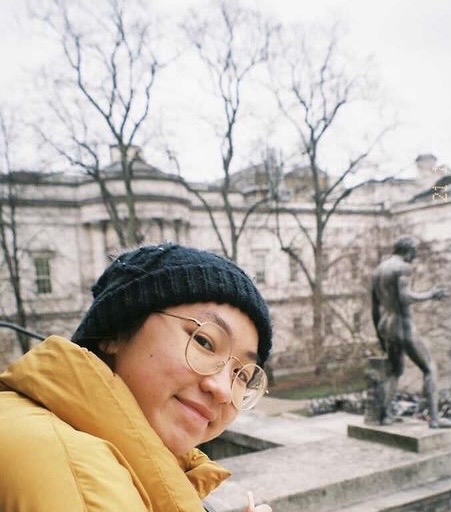
Nguyễn Thanh Hiện’s Chronicles of a Village follows an unnamed narrator who tells the tales of a village which is geographically unmarked. Through an oral storytelling and prose-poetry style, the narrator contemplates upon biopolitical and philosophical ideas, from modernization in Vietnam to our relationship with the environment and the nature of language. All the while, the question of recording, archiving, and constructing History haunts every page.
The translator Quyên Nguyễn-Hoàng is someone whose work I have been following closely—her poem “Learning Late Letters,” among others, have left a big impression on me. Having read this translation, my appreciation of her as an artist grew: not only in the style she manages to conjure, but how she simultaneously gives new life to Vietnamese words and renews the linguistic praxis of English. And I hope that this conversation will spark, reignite, and add to discussions on the topics previously mentioned.
This interview was conducted over email.
Phương Anh Nguyễn: Despite the title “chronicles,” this concept is put under revision through the non-linear and oral storytelling style besides also being semi-fictional. With history as a “draft copy,” the novel also asks the reader to self-learn. This made me wonder about the potential role of fiction in defying History, and in turn, enabling us to rebel against authority.
Quyên Nguyễn-Hoàng: These half-forgotten fragments of remembrance are called “tin tức” in the novel; tin tức in Vietnamese can mean news, information, updates, stories, tales. Tin tức, translated here as “chronicles,” draws attention to the fictive tales’ relation to historical accounts and narrative records. The novel offers a rather informal, unjournalistic, fragmentary and linearity-defying transmission of these little stories about a village that seems so alive but, at the same time, seems to be receding into the elusive substance of memory. As mentioned several times in the book, this kind of chronicle, in its disorderliness, is frequently erased from official history. The deliberate slipperiness allows the village scribe’s stories to stray away from the habitual methods of control and coherence in modern Western historicism. As the scribe says, these shreds of memory gather and disperse the fatal deformations of a land. A land tyrannized by violent, human-centered forces.
PAN: I am also quite struck by the image of the “sightless humans” who seem to be those who recklessly and uncritically follow an order of evolution. Their chant, “let’s together march forward,” echoes certain existing ideologies in Vietnam and certain other countries striving for development and progress. Do you feel that the depiction of this group is a general warning against our yearning for progress?
QNH: The disaster certainly has to do with the often nationalistic and patriarchal obsession with economic progress, industrial productivity, wealth accumulation, institutionalized knowledge and technological advancement. When all that the eyes can see is the bloodless competition to accrue as much profit and power as possible, a certain blindness obscures the vision, befuddling and steering it away from the light of beings and things that are deemed backward, primitive or useless by the mercantile and managerial rhetoric of improvement. I suppose this contagious blindness is what led both the author and myself to experience a sense of grief, and to work on this text out of that grief, toward an infinite conversation among peasants, poets, soil, skies, wind chimes, ghosts, birdsongs, lullabies, mythical creatures, the suffering living, the suffering dead—forms of being that are suppressed by the violence of hyperrational abstraction, rapacious calculation, globalized technocapitalistic development and other cruel optimisms.
One way to recover a bit of sight, and solace, according to this book is to relearn humility and unlearn extraction as we live with the earth. As the plowman-poet in the story knows, one must follow “the rhythm of earth and sky, leaning on sky and earth to survive, without earth and sky there would be nothing, tilling earth to plant rice is a way of negotiating with earth, a way of pleading to earth please grace us humans with a bit of rice, a piece of clothing.” Nguyễn Thanh Hiện’s poetics is acutely aware of the smallness and brevity of one’s life within the cosmic vastness of the soil, the skies, the years.
PAN: On a similar note, the novel also beckons us to rethink nature and the land through the narrator’s marveling and ponderings. The picture is not of an idyllic pastoral landscape, but one that is also sorrowful and at times bleak. Yet, the people there never stop listening to the “rhythm of nature,” because the land is another important “memory-vessel” for the story of the past. How does this relate to environmentalism in Vietnam today?
QNH: Listening to what the little seeds in the land have to say or sing to us is not only relevant to the ecological degradation in Vietnam. If we could start practicing what some of the characters in the book naturally do—which is to think of human beings as not superior to, but interdependent with other species, and in some cases, just as wretched as the earthworms squirming at our feet—then perhaps our relationship with earth, and air, and other creatures would be a little less destructive and poisonous, a little more entwined and even magical. The scent of flowers, for instance, is not something banalized, frivolous, ornamental. Unseeable and uncontainable, it is a material substance distilled from rain and sunshine that can infuse us with “a momentary calm before the bedlam of the world,” can center us amidst the centerlessness of the world, if we let it enter into our nervous, wretched selves. Instead, as seen in the novel, and in our world, most humans prefer to squander their lives chasing after professional promotions, false prestige, imagined security. At the moment, I find myself flowing closer to the novelistic characters fated to squander their lives entering into the perfume and decay of wild flowers.
PAN: In midst of the violent carnage of the land, the vitality of beings in their abundance still pulses through, as summed up in this quote “There is a profound philosophy of existence concealed within the deepest sentiments of human beings, something even now I haven’t fully understood.” This juxtaposition of vitality and destruction is something I also felt in reading your other works like “Learning Late Letters.” What is it about this duality that attracts you? And could this be partly why you were drawn to this text when choosing to translate?
QNH: This co-presence, instead of a binaristic either/or, of domineering violence and inextinguishable vitality attracts me because I think it reflects the suchness of our reality. Humans have been mutilating the land, and each other; humans have also been shaping breath-taking works of art out of a deep, perhaps inexplicable, care for, even obedience to, other humans, and other species, like the species of animal and divine forces. This novel’s quiet and nonchalant embrace of human and nonhuman kinships teaches me to listen, with more affection, to the ceaseless rhythm and flow of life that courses through all beings, and through even the inevitability of disintegration, disappearance and destruction of all earthly existences. The village scribe is someone who knows how to practice this listening, as in this passage early in the book where he went up the hillside as a child to listen to “the stirrings of the mountains and forests, the wilting leaves were a trace of sadness, and the yellowing foliage a trace of gloom, as the forest shed visions of decay and recovery onto my mind, the fallen leaves were turning into a poetry of the fall.” This enigmatic, cyclical circulation of decay and recovery continues to echo again and again across these chronicles of the joyful-sad months and years.
One more thing—among the reverberations of the fallen dynasties, calamities and ashes of the centuries, there is always in this book an undercurrent of a love story, whether a childish infatuation, or a floating romance made on the clouds, waters and fires of myth, or some unnamable affair. I’m also drawn to this intermingling between affliction and laughable-lamentable, irresistible love.
“Learning Late Letters” is part of a body of work where I chronically cite authors that have touched my thinking. Perhaps Nguyễn Thanh Hiện will make a cameo appearance in a future poem of mine.
PAN: In your afterword to Chronicles, titled “Soil and Scent,” you talked a bit more about the story and touch upon how you view translation as recognizing the scent of a text. Could you tell me more about that process? Where there any difficulties?
QNH: Scent is hard to pin down, identify, verbalize, classify. One could try to imagine the scent of the village as the odor of the forest, the aroma of childhood playtime, the fragrance of adolescent adventures, the blood smell of war, of venomous ideology. But all these descriptions are insufficient and asymptotic. Translation is an endless game of chasing the traces of someone else’s scent while constantly facing one’s own language deficiency.
My translation process consists of many revisions and the occasional email to the author when I needed to clarify certain geographic references I didn’t know. The most intellectually and psychically charged part of the process actually came after the final draft had taken shape, when I asked my friends to read the manuscript and share their thoughts, which allowed me to see the text, and my relationship with it, much more clearly. It is perhaps important to note that all of these friends are female and nonbinary writers who lovingly made time to read and support my work. There is a profound philosophy of existence concealed within the deepest sentiments of woman/native/other writers being here and there for each other, reading each other, writing to each other, year after year, something like a desirable debt I could never repay.

Quyên Nguyễn-Hoàng is a writer-translator born in Việt Nam. Her recent publications
include Masked Force (Sàn Art), a bilingual pamphlet on a set of propaganda photographs by
Võ An Khánh, and Chronicles of a Village (Penguin SEA), her English translation of a novel
by Nguyễn Thanh Hiện. Her work has appeared in Poetry, the Margins, and various other
venues. She studied at Stanford University.

Phương Anh Nguyen is a translator, writer from Việt Nam, and an editor at GENCONTROLZ. Their words have found homes in magazines and blogs such as Asymptote, PR&TA, Interpret
Magazine, Agapanthus and forthcoming on SAND. Currently, they are doing cultural studies
at University College London, and are a part-time bookseller at Waterstones.


